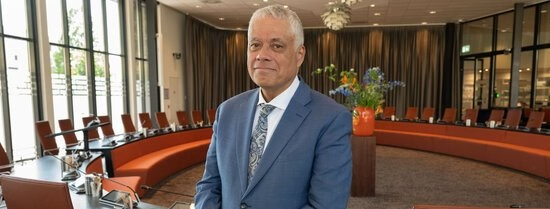Joost Manusama has been mayor of Capelle aan den IJssel for six months now. He previously had a career in the police and studied public administration at Erasmus University Rotterdam. What appeals to him in the office of mayor? And how did his time here at the university and with the police form him?
The mayor of Capelle once rode a police motorcycle, was in the criminal investigation department and eventually led the police organisation in Zeeland. “I first had a commercial job, but soon found that I wanted to be more socially involved,” he said. Through a special academic intake, people with university backgrounds could go to the police officer training program. That was a perfect fit."
His career in the police spanned more than 30 years. As he moved up in the organisation, his role became increasingly political. The transition from the police to his position as mayor is therefore not so strange, according to Manusama, and is more common: "As police chief, you are also an advisor to the mayor. You join the triangle and think about security and public order. You learn how the administrative lines run and how policy lands in practice."
"A place where I can be meaningful"
When the vacancy for the mayor's position came up, it felt like a great new step. "I lived here as a child, my family lives here, and my children went to school here. I knew the city and its dynamics. And I knew: this is a place where I can be meaningful." The reception was warm, he says. "Not only by the board and the council, but also by the residents. It is a city with village-like qualities: people still know each other here, and talk to you on the street. That fits well with my way of working."
During his career with the police, he was socially active in many other ways. "I have been a board member of housing corporations, a member of the committee on undesirable behaviour at the Ministry of Foreign Affairs, and I am on the advisory board of police studies in Leiden." For the mayor, this is not a side issue: "If you want to tackle things integrally, you also have to understand how they are connected. And for that, you also have to dare to look outside your own box."
Coherence of social themes
That is exactly why the mayorship appeals to him so much. "In the police, you mainly work with one domain: security. But here you deal with all social themes at once: from housing to care, from education to poverty, from sustainability to economy." That breadth requires overview and insight, but also a sense of timing and relationships. "You can't do everything at once. But you always have to realise that every decision has consequences elsewhere. If you do something about housing construction, for example, it affects other facilities and social cohesion in a neighbourhood. Everything is interrelated."
He sees studying public administration as a practical study that gave him a solid foundation. "You learn to read policy documents, but also make them. You gain insight into how governments work, decision-making, and economics. And you learn to take a broad view," Manusama says. During his studies, he did not sit still. He was a member of the municipal council of Krimpen aan de IJssel, chaired the JOVD Zuid-Holland and was active in SRR. The mayor also has fond memories of the university itself: "Even then, I thought it was a progressive and internationally oriented university. And professors like Rinus van Schendelen and Lex Cachet really inspired me."
Knife violence and research
One of the tasks in Capelle that is particularly close to the mayor's heart is tackling youth crime. Just recently, a number of youths were arrested for violence and weapons possession around the Capelsebrug metro station. Capelle cooperates with other municipalities such as Rotterdam and Schiedam, and has even appointed a special city marshal who focuses entirely on youth crime. Manusama is also looking at Erasmus University, where research is being done on tackling knife violence. ‘We are definitely looking at relevant studies going on there,’ he says.
His plea to the university is clear. Erasmus University's big plus is its strong focus on impact, Manusama believes. "As a university, stay at the centre of society. Use the knowledge there to contribute to better solutions. Whether it is about polarisation, security, sustainability or equal opportunities: the university has the network and resources to really make a difference. But then you have to dare to step out into the world."
Spark interview
This interview was held by Karst Oosterhuis and is a part of Spark. With these interviews we want to draw attention to the positive impact that the faculty's education and research have on society. The stories in Spark provide an insight into what ESSB students, alumni, employees and researchers are passionate about.
- More information
Contact: Marjolein Kooistra, communications ESSB, + 31 683676038, kooistra@essb.eur.nl

